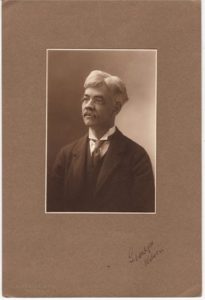
Butler R. Wilson
*Butler Wilson was born on this date in 1861. He was a Black attorney, activist, and humanitarian.
Butler Roland Wilson was born in Greensboro, Georgia, to Dr. John R. and Mary Jackson Wilson, free people of color. His father was a physician and civic leader in the Atlanta area. Wilson attended Clark/Atlanta University, where he was captain of the varsity baseball team and voted class orator. He received his B.A. degree in 1881 and M.A. in 1884.
Wilson went to Boston to enter the Boston University School of Law against his parents' wishes, who wanted him to become a minister. He graduated with honors in 1884 and was admitted to the Massachusetts Bar Association the same year.
On June 27, 1894, Wilson and Mary P. Evans were married by the Reverend Francis James Grimké. The couple moved and raised six children. Mary Wilson became a well-known activist in her own right; she was a founding member of the Women's Service Club, NAACP Boston branch. Soon after admission to the bar, Wilson briefly partnered with Archibald Grimké. He also worked for several years with Judge George Lewis Ruffin. In 1887, Wilson opened his criminal law practice and became one of the most respected attorneys in New England.
Later, Wilson aligned with activists who were critical of Booker T. Washington's accommodationist approach. When the Niagara Movement was organized in 1905, Wilson was one of the original signers and served on the organization's Legal Committee. One of his early clients was Moorfield Storey, a white founding president of the National Association for the Advancement of Colored People (NAACP).
In 1911, the American Bar Association (ABA) admitted three African Americans to its membership: Butler Wilson, William Henry Lewis, and U.S. Assistant Attorney General, both of Boston and William R. Morris of Minneapolis. At the time, the executive committee did not know these candidates were "colored men." In January 1912, upon learning that Lewis was black, the ABA's executive committee voted to rescind his membership. That August, they rescinded the memberships of Wilson and Morris as well. Boston NAACP and the Massachusetts Bar Association members vigorously defended the two Boston attorneys. Former Massachusetts Attorney General Albert E. Pillsbury, who opposed racial restrictions, resigned in protest over the issue in 1913. The ABA continued to discriminate against other applicants of color for several decades.
Wilson and his wife were among the organizers of the Boston branch of the NAACP, the organization's first local branch. Wilson was the branch's first secretary and joined the national board in 1913. In the early 1920s, he became branch president and held that post until 1936. Under his leadership, the Boston NAACP strove to improve educational opportunities for black children in Boston, protested offensive books and films, opposed legislation banning interracial marriage, and fought segregation in housing, hospitals, and the YMCA.
In 1913, acting on behalf of the NAACP, he and Clement G. Morgan persuaded the directors of Boston's YMCA to change its discriminatory swimming pool policy. The following year, he led a successful campaign to remove a songbook containing racial epithets from Boston's public schools. Wilson was one of the main leaders of an unsuccessful effort to ban the race-baiting film The Birth of a Nation from Boston theaters. Other local leaders of the campaign included William Monroe Trotter, Lewis, and Morgan. In 1921, Trotter succeeded in banning the film in Boston by allying with the Catholic Church. During World War I, Wilson opposed the creation of segregated training camps for black officers.
Wilson was instrumental in getting the city to erect a monument to Crispus Attucks and the other victims of the Boston Massacre. The bronze and granite monument stands on Boston Common, near Tremont Street between Avery Street and West Street. Wilson was a director of the Boston Home for Aged Colored Women, board secretary of the Harriet Tubman House, a settlement house in the South End, and a member of the American Red Cross. In 1917, he was appointed to the board of appeals on fire insurance rates, a post he held for the rest of his life.
Wilson was a vocal supporter of the pre–WWI Republican party and often urged Boston's black men to support Republican candidates. In 1892, speaking at a political rally, he declared, "The negro who votes the Democratic ticket is either a fool or a knave." In the South, white Democrats in control of state legislatures had begun disenfranchising most blacks and many poor whites by creating barriers to voter registration. This exclusion of blacks from the political process crippled the Republican Party in the South.
A believer in the power of education, Wilson said it was America's duty to give "every citizen an education commensurate with his character and ability" and "a fair field in which to use it." He supported voting rights for women and was a member of the Massachusetts Men's League for Women's Suffrage. Wilson died of pneumonia in Boston on October 31, 1939, at the age of 79.